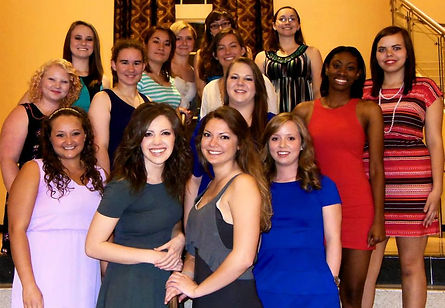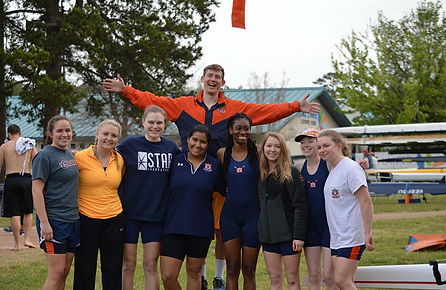Tyanna
Malone
Tyanna's Project Interests:
Energy Conservation & Sustainability
I've grown up all over Georgia and Alabama, and even out of the United States in Panama. As the daughter of two military parents, traveling and new experiences have been a staple in my everyday life, as well as being exposed to diverse people and cultures. One year, we would be settling in in Columbus, GA beside a creek, while the next, we'd living in an apartment complex overlooking the marsh lands surrounding highways in Savannah, GA. However, whether I lived on the polar opposite sides of Alabama and Georgia, or even in the bustling hub that is Panama City bordering a lush jungle, they all had two needs in common: Energy and sustainability.
Living in so many different environments as both a child and as an adult impacted me later on in life. I would pose the question to myself: "How could we advance our society without destroying the things around us? How could we reduce our energy consumption and find more reliable, clean alternatives?"The Yarbrough Elementary School project allowed me to consider these things on something that already existed. While they may seem infinite, natural gas and coal have negative effects on our environment in both extraction and consumption. This project allowed me to research ways for individuals and groups to reduce their electrical consumption/waste and other methods of sustainability such as reducing our carbon footprint, recycling and others.
Electricity consumption and alternative energy resources such as solar can greatly reduce carbon footprint. In the case of the school, just being instilling better energy management practices, Yarbrough could decrease their consumption by nearly ten percent and save thousands of dollars per year. This money could be taken and placed into retrofitting the school more or possibly helping to educate students more on the necessities of sustainability. Small changes can make a difference over time, although staff and students to see the changes in real time.


Alpha Omega Epsilon - Beta Nu chapter-Founding Members Class

Auburn University Club Rowing Team - Women's Crew - Spring 2017
Tyanna's
Career Goals
I am currently a senior majoring in Biosystems Engineering, although I originally started out as a Computer Science major during my freshman year. Although I still enjoy coding, I didn't feel like I could make a definitive impact on the symbiotic relationship between humanity and the environment by writing programs. Eventually, I found Biosystems, where I could mix my love of technology and engineering with a respect for the ecosystems that surround us.
The Yarbrough project has driven my desire to make sure whatever we create as a society has a positive or neutral impact on the environment. I have a passion for sustainable buildings and energy and Yarbrough has provided me with an example of how our current buildings can be modified to be more beneficial. The energy reduction of the school can be optimized by using existing technology and management practices. Although it may not be incredible obvious, Yarbrough has also ignited one of my career goals of creating more sustainable products and sustainable product manufacturing. While researching Energy Star fans, appliances, and other electronics for the school, I began to question what materials these products were made from, how are they saving energy, and are they being manufactured with as little impact on the environment as possible. This project has shifted my thinking from what just saves energy and money to what saves those ideals, as well as promotes a healthy trend in developing our everyday comforts such as our homes, places of work, cars, and even our cellphones in a more sustainable, ethical manner.
Project Contribution
For the YES project, I performed research and calculations on energy savings with fans and how Yarbrough can utilize energy efficient practices to lower their costs and carbon footprint. While conducting my options after our site visit, I realized that a large portion of schools' energy costs come from space heating and cooling. I looked into ways to lower those costs and found that raising or lowering the thermostat temperatures beyond their usual settings can save nearly three percent per degree. However, since we didn't have energy or water bills for the school, I contacted facilities management at Auburn University and chose a building of similar size and capacity. I gathered the data sent to me and calculated the energy savings from changing both the thermostat settings and keeping the thermal comfort intact for both students and faculty.
Additionally, I also researched and developed best management practices for the school to reduce their energy costs. Rather than retrocomission the entire school, behaviorally based practices such as making sure to facuets are turned off when children are using the sinks, can make a large impact on energy costs while providing a learning incentive for children and staff. I wrote an easy to read a technical manual for the elementary school containing some of these practices.
What I've Learned
This project gave me great insight into different engineering techniques and design.I learned about different theories and concepts throughout college, but I never was able to apply them to a real-world setting that could have an impact. I'm used to doing homework, taking a test, and repeat. However, this project taught on how to manage a client's needs and wants, deliver them, and manage a design and budget. Unlike homework, where there's one answer and possibly one or two ways to accomplish said answer, this project didn't come with a set of instructions. Nothing was given to us and this allowed me to pull everything I've learned in college together to design something efficiently.
Finally, I learned what it truly means to be an apart of a team. There really isn't such a thing as a "lone engineer". It takes multiple people to make a project come to fruition. I've always struggled with communication, as I prefer to work behind the scenes on projects. However, while working on the YES project, it felt like our group "clicked". It was easier to communicate, delegate work, and other things. I know other groups struggled with each other, but I feel my group worked well together because of our varying personalities, work styles, and our commitment to getting the job done.